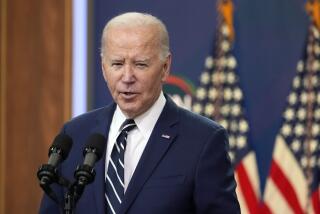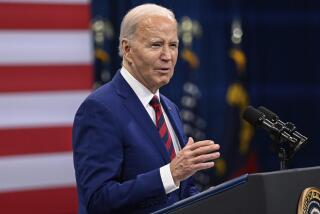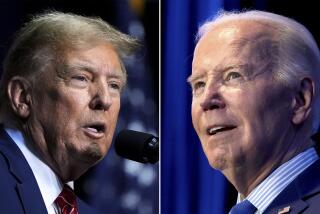Poll watch: Talk of turning point for Obama premature
WASHINGTON -- After a string of favorable polls for President Obama, some Democrats have begun to talk of a turning point in the race; that’s probably premature.
It is true that most surveys this week -- both national and in key states -- have delivered better news for Obama than for his Republican challenger, Mitt Romney. In the polling averages that Real Clear Politics and the Huffington Post maintain, Obama stands at his best level since late April. The polls also have shown an increase in the percentage of voters who view Romney unfavorably, an indication that Obama’s attacks on the Republican have taken a toll.
But Democratic partisans should take note that the movement in the polls is small and varies depending on which polling techniques are being used. Current national polls run from a four-point Romney lead in the Rasmussen tracking survey to a 10-point Obama lead in last week’s Pew Research Center poll.
And Obama remains vulnerable on several measures. The same polls showing Obama in the lead also show majorities disapproving of how he has handled the economy, which voters continue to say is the most important subject. And although Romney is less popular than Obama, the president’s favorability ratings fall below those of predecessors who have succeeded in winning reelection.
One other potential trouble spot for Obama: Most polls being conducted this month survey all registered voters. When pollsters switch over to surveying likely voters, which most do after the nominating conventions, Republicans usually gain at least a couple of points because their supporters, who tend to be older, are more likely to show up to vote. If that pattern holds this year, Obama’s polling lead in September can be expected to be smaller than what this month’s surveys look like.
All that being said, the numbers have caused anxiety among Republicans and the sort of griping about the candidate and his advisors that typically happens when a party’s activists believe they are falling behind.
The poll that seemed to spur the most such reaction was the latest Fox News survey, which showed Obama with a 49%-40% lead among registered voters. The poll showed a notable drop in Romney’s favorability, with 46% viewing him favorably and 45% unfavorably, as compared with a 52%-40% division in July. Obama’s favorability had risen slightly, to 54%-42% from 52%-46% the month before.
Asked how “comfortable” they would be with either man being president, 41% said they would be either “extremely” or “very” comfortable with Obama, the same level as four years ago at this point in the race. By contrast, only 26% said as much about Romney. For both men, virtually identical percentages said they would be “not at all” comfortable, 38% in Obama’s case and 37% for Romney. The numbers suggest that each has a similar hard core of opposition but that Romney still has considerable ground to cover to convince a majority of voters to see him as a plausible president.
Romney had a small edge, 46%-43%, on the percentage of voters who said he would be better at “improving the economy.” But Obama led on most other questions that asked which candidate would be best for specific subjects, including handling foreign policy, national security, healthcare, taxes and “helping people achieve the American dream.”
The percentage of voters who said that Obama’s positions on issues were “too liberal” has declined to 41% from a high of 47% in the summer of 2010, the poll showed. The current level is the same as it was just before Obama’s election in 2008. The percentage saying his positions are “too conservative” has ticked up from 3% four years ago to 7% now.
The survey also showed that as Obama’s standing has gone up, so, too, has the percentage of voters who identify themselves as Democrats. In the current survey people who identified themselves as Democrats outnumbered Republicans by 44%-35%, up from near parity earlier this spring. That same finding of an increase in Democratic identification has turned up in polls by other organizations, including the NBC/Wall Street Journal and Pew Research Center surveys.
Republican partisans have objected that Obama’s standing in several polls stems from having too many Democrats in the sample, but pollsters for each of the organizations have said that the reverse is taking place -- loosely affiliated voters change their minds about which party they identify with as they start seeing Obama as the person likely to get their vote.
The Fox survey, conducted Aug. 5-7, questioned 930 registered voters by telephone, including landlines and cellphones, and has a margin of error of plus or minus 3 percentage points.
david.lauter@latimes.com
More to Read
Get the L.A. Times Politics newsletter
Deeply reported insights into legislation, politics and policy from Sacramento, Washington and beyond. In your inbox three times per week.
You may occasionally receive promotional content from the Los Angeles Times.







